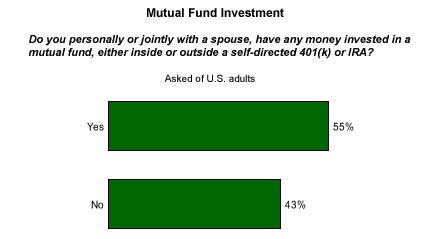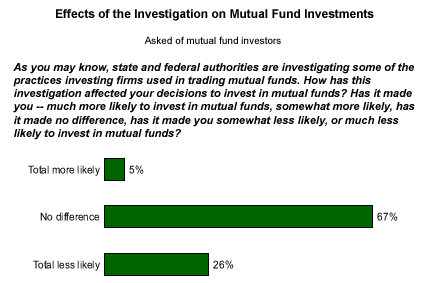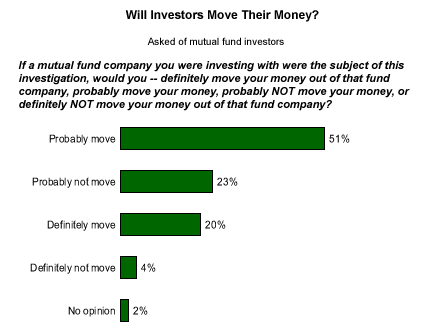Mutual funds give individual investors access to a diversified portfolio of assets that are in line with their investment philosophy, something they might not ordinarily have the resources to create on their own. This concept is clearly a compelling proposition -- the Investment Company Institute estimated that 95 million Americans owned mutual funds in 2002, and in response to an Oct. 24-26 Gallup Poll*, 55% of American adults said they invest in mutual funds, either personally or jointly with a spouse.

According to the Investment Company Institute, in 2001, the median income of a mutual fund-owning household was $62,100, and many of these households used mutual funds to save for retirement. At an estimated total value of $2.1 trillion at the end of 2002, retirement accounts make up a third of all mutual fund assets. By pooling individual investors' assets, mutual funds are able to offer the diversification, size, and extensive research capability that only a professional investor would normally have access to. But the mutual fund scandals currently being investigated by New York Attorney General Eliot Spitzer provide a reminder that the arrangement can be twisted around -- by granting certain traders and hedge funds "late trading" and "market timing" privileges, some mutual fund companies have allowed professional traders to profit at the expense of average investors.
While many Americans look at mutual funds as a means to provide for their retirement, mutual fund investments are also their ticket to participating in the equity markets. A study by the Investment Company Institute and Securities Industry Association** finds that while 89% of equity market investors own stock mutual funds, only 49% are direct owners of stocks.
The Aftermath of a Scandal
The recent Gallup Poll examined public attitudes toward current mutual fund fraud investigations, and found that more than one in four Americans who are invested in mutual funds (26%) said they are less likely to invest in mutual funds in the aftermath of the scandal. Interestingly, the vast majority of American mutual fund investors (67%) are indifferent and said that the investigation of fraudulent practices will not affect their decisions to invest in mutual funds.

So even though most Americans said they will continue investing in mutual funds as they might have done before, a sizable number may also be looking for other investment vehicles. Demand for Exchange Traded Funds (ETFs), which track the performance of an index and trade like stocks, could increase if investors search for alternatives. ETFs come with lower expense ratios than mutual funds, are more tax efficient -- and at an estimated total value of $119 billion, the market for ETFs has nearly doubled from where it was two years ago.
Lest one take the findings to suggest most Americans have taken the latest financial services industry exposé in stride and the mutual fund business will come out unscathed, results of another Gallup question should be considered. Seventy-one percent of mutual fund investors said they would definitely (20%) or probably (51%) move their money out of their current mutual fund portfolio if the company they are invested in became the subject of a Securities Exchange Commission investigation, indicating that mutual funds companies that have been identified by the SEC could feel the wrath of investors.

Bottom Line
The mutual fund scandal began with the curious case of Edward J. Stern, heir to the Hartz Mountain pet food fortune, who allegedly traded mutual funds after hours and received preferential treatment from financial institutions at the expense of smaller investors. Stern has agreed to pay a $10 million fine and $30 million in restitution. The scandal has quickly snowballed (the New York attorney general has said that charges will likely be brought against mutual fund companies themselves) and threatens to cast a shadow over the entire industry. As the markets rally on the strength of strong economic news, the SEC investigation may be coming at a bad time for mutual funds.
*Results are based on telephone interviews with 597 mutual fund investors, aged 18 and older, conducted Oct. 24-26, 2003. For results based on the total sample of national adults, one can say with 95% confidence that the margin of sampling error is ±4 percentage points.
**Survey conducted by the Boston Research Group in January and February 2002 under the direction of the Investment Company Institute and the Securities Industry Association.

